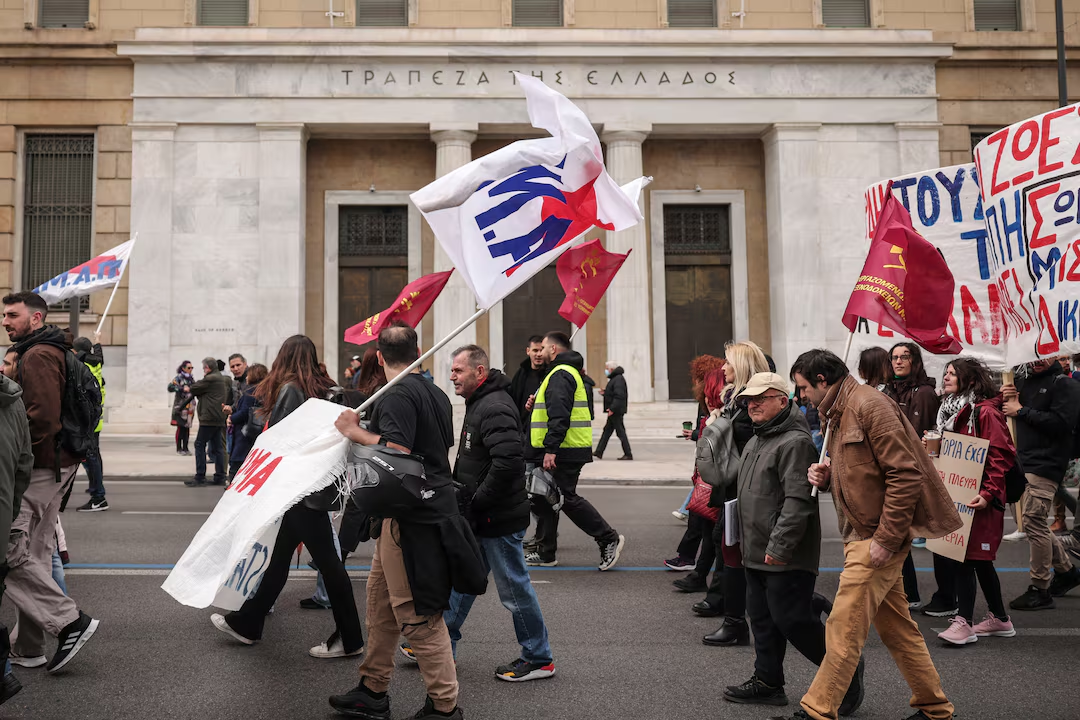ATHENS – Thousands of Greeks took to the streets of Athens on Wednesday in a powerful display of discontent, demanding significant wage increases to combat the country’s soaring cost of living. The one-day strike brought the capital to a standstill, with ferries marooned in port, flights grounded, and the national rail network completely shut down.
The industrial action wasn’t limited to transport. Air traffic controllers, municipal employees, and bus and metro workers across Athens joined the walkout, painting a picture of widespread economic anxiety.
Greece, of course, is still recovering from its crippling debt crisis of 2009-2018. Austerity measures imposed in exchange for those massive bailouts – some €290 billion in total – saw wages and pensions slashed. While the Greek economy is now showing signs of robust growth, projected at 2.3% this year and outpacing many of its Eurozone partners, the benefits are clearly not being felt by ordinary citizens.
The centre-right government of Kyriakos Mitsotakis has increased the minimum monthly wage by a cumulative 35% since taking office in 2019, bringing it to €880. However, unions argue that this is simply not enough. The General Confederation of Greek Workers, representing over two million private sector employees, claims that Greeks are buying 10% fewer goods than they were in 2019 due to rampant inflation. They are calling for substantial pay rises and the reinstatement of collective labour contracts.
“Workers’ salaries are simply not keeping pace,” explained Dina Gkogkaki, a 52-year-old representative of private sector workers, as she protested in Syntagma Square. “They barely last beyond the middle of the month and cannot cover basic necessities like housing, food, education, and healthcare.”
Eurostat data reveals a stark reality: Greece’s minimum salary, when adjusted for purchasing power, is among the lowest in the EU, lagging behind countries like Portugal and Lithuania. While the average gross salary stands at €1,342 a month, it remains 10% lower than in 2010, before the first bailout agreement.
The government insists it is committed to fiscal prudence, citing the need to manage Greece’s massive national debt – still the highest in the Eurozone – and limit interest payments. While acknowledging workers’ concerns, Finance Minister Kyriakos Pierrakakis, speaking at an economic conference, emphasized the government’s priority remains tax reduction. The government has promised to increase the minimum wage to €950 by 2027 and to target an average gross monthly salary of €1,500, closer to the EU average.
The striking public sector workers, who bore the brunt of austerity measures, are demanding the reinstatement of annual bonuses that were eliminated a decade ago. “Our wages are stuck at 2011 levels,” lamented Diana Liakou, a 58-year-old kindergarten tutor.
See more: Trump Tariffs Threaten Wine Supply
The situation in Athens highlights the ongoing tension between economic recovery and the social cost of austerity. While Greece may be on the path to fiscal stability, the question remains whether ordinary Greeks will see a tangible improvement in their living standards any time soon.





